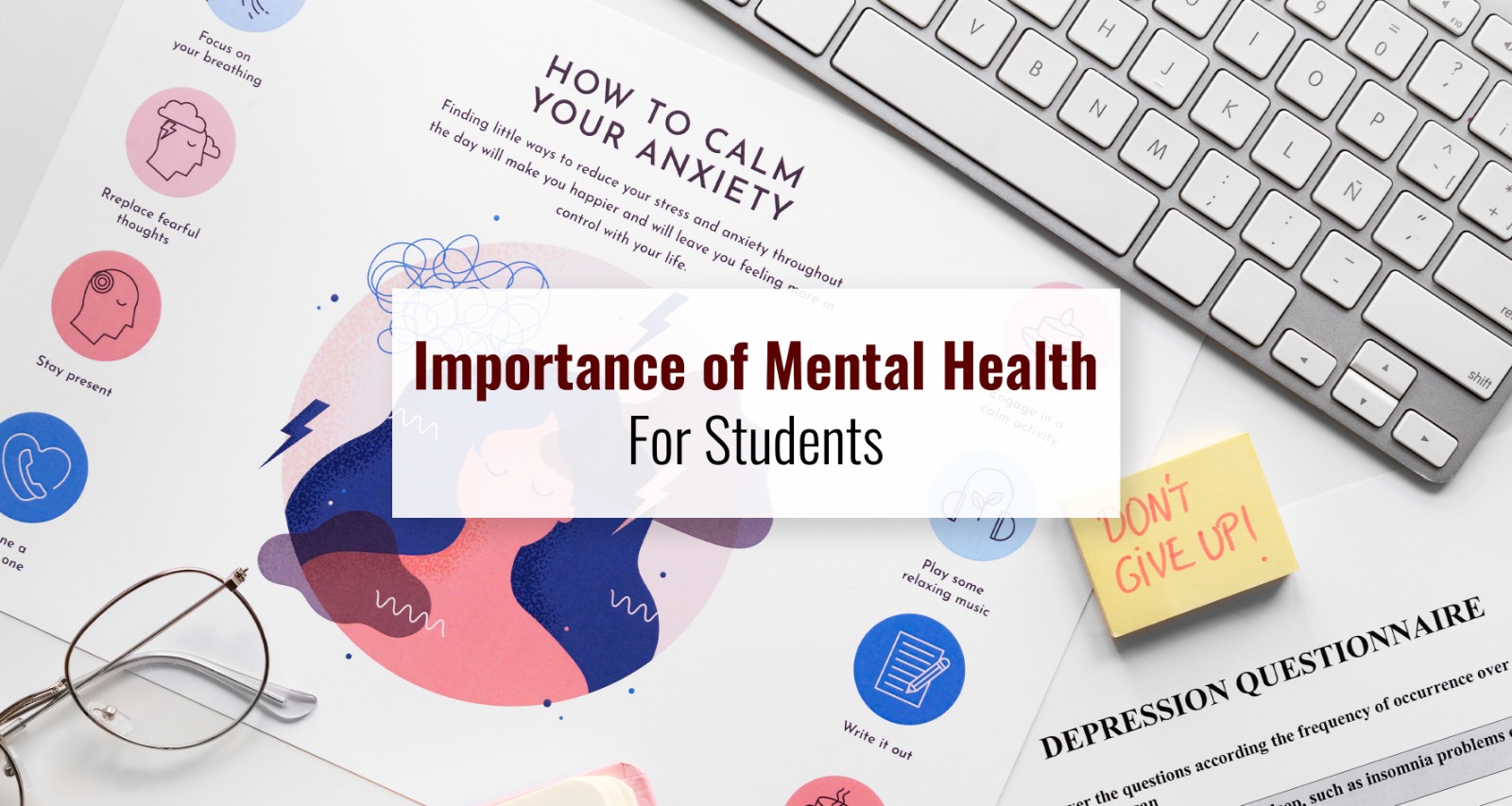
Importance of Mental Health For Students
Table of Contents:
- The Student Mental Health Crisis
- The Effect of Mental Health on Students
- Signs of Mental Health Issues in Students
- Addressing Mental Health Challenges in Students
- FAQs About Student Mental Health
Introduction
Pursuing academic success, social engagement, and personal growth may be a rewarding journey for students. Nevertheless, it’s a path laden with challenges to one’s emotional well-being, stress, and anxiety. Understanding the importance of mental health for students for the overall well-being is crucial as they juggle the challenges of both life and education. In this blog, we’ll go over the importance of mental health for students, how it impacts academic success, and some frequently asked questions concerning it.
The Student Mental Health Crisis
The crisis on mental health for students is a serious problem in today’s society. Anxiety and depression are among the mental health conditions that are more common among students as a result of the pressures that their education and social environment place on them. According to the American College Health Association, more than 40% of college students said they encountered more stress than usual, and 60% said they experienced severe anxiety in the previous year. Thus, the importance of mental health for students is a subject that ought to be addressed earnestly.
The factors contributing to this crisis include academic pressures, financial burdens, social challenges, and the uncertainties of the modern world. Students often juggle coursework, part-time jobs, extracurricular activities, and personal relationships, which can be overwhelming. As a result, mental health issues have become more prevalent among this demographic.
The Effect of Mental Health on Students
There is no denying the connection between academic success and mental health. The emotional and psychological health of a student has a direct impact on their capacity for concentration, learning, and academic success.
Here are some ways in which mental health can impact academic performance:
a. Concentration and Learning
Problems with mental health can make it difficult for students to focus and participate in the learning process. As for instance, depression and anxiety can make it difficult to concentrate, process information, and engage fully in class.
b. Time Management
Mental health challenges often lead to poor time management. Students may struggle with procrastination, have difficulty prioritizing tasks, or become overwhelmed by deadlines.
c. Attendance
Students with mental health issues might skip more school, which may have a negative impact on their academic performance and lead to missed lessons.
d. Performance on Exams and Assignments
Students dealing with mental health challenges may struggle with test anxiety or experience difficulty completing assignments, leading to lower grades.
e. Drop in Motivation
A student’s motivation and excitement for learning can be diminished by mental health problems, which can impede their academic progress.
Signs of Mental Health Problems Among Students
Recognizing mental health challenges in students is the first step in providing the necessary support. Here are some common signs to watch for:
a. Changes in Behavior
- Social withdrawal or isolation
- Irritability and mood swings
- Increased alcohol or substance use
- Changes in eating habits (overeating or undereating)
b. Emotional Indicators
- Persistent sadness or mood swings
- Anxiety, panic attacks, or excessive worry
- Low self-esteem and self-worth
- Feelings of hopelessness or despair
c. Physical Symptoms
- Unexplained physical complaints (headaches, stomachaches, etc.)
- Changes in sleep patterns (insomnia or oversleeping)
- Weight changes
d. Academic Red Flags
- A noticeable decline in academic performance
- Missing classes or assignments
- Difficulty concentrating or staying engaged in class
Addressing Mental Health Challenges in Students
Supporting mental health for students is crucial for their overall well-being and academic success. Here are some strategies and resources for addressing mental health challenges:
a. Encourage Open Communication
Establish a secure space where students can talk to peers, teachers, and counselors about any worries they may have about their mental health. Promote conversation while paying attention to their anxieties and fears.
b. Promote Self-Care
Teach your students the importance of self-care, emphasizing the need of a balanced diet, regular exercise, and adequate sleep. Stress-relieving techniques like mindfulness and meditation should also be emphasized.
c. Access to Counseling Services
Counseling services are widely available in educational institutions and can assist students in managing their mental health. Students should be encouraged to use these resources as needed.
d. Peer Support and Mentoring
Mentoring and peer support programs can be helpful in connecting students with people who can guide them and who understand their struggles.
e. Raise Awareness
To lessen stigma and raise awareness, host seminars, workshops, or awareness campaigns about mental health issues. Teaching pupils about mental health can foster empathy and understanding.
f. Professional Help or Free Psychological Help
In circumstances involving severe mental health issues, it is imperative to connect students with mental health professionals who can provide specialized care and support.
Conclusion
The importance of mental health for students is a significant issue that affects both their overall wellbeing and academic achievement. Recognizing the early indicators of mental health problems, offering assistance, and fostering an accepting and communicative culture are all necessary to address this crisis. By highlighting the importance of mental health and assisting students in achieving both academic and emotional success, we can create a positive learning environment for them.
Also Read: Bullying in Schools: Types, Consequences, and Preventive Measures
FAQs
Q1: What are some common stressors that students face in terms of mental health?
Students face a variety of stressors, including academic pressures, financial worries, social expectations, and the challenges of adapting to new environments, especially in college or university.
Q2: Are mental health issues more common among certain age groups of students?
Mental health issues can affect students of all ages, from elementary school to higher education. However, the severity and nature of these issues may vary.
Q3: How can parents and guardians support their children’s mental health during the school years?
Parents can support their children’s mental health by maintaining open communication, recognizing signs of distress, and seeking professional help when necessary. Creating a supportive and understanding home environment is also essential.
Q4: What role can schools and colleges play in addressing student mental health?
Educational institutions can play a significant role by offering counseling services, promoting awareness, creating a supportive environment, and providing access to resources for students struggling with mental health issues.
Q5: How can students themselves take proactive steps to protect their mental health?
Students can take proactive steps by practicing self-care, seeking help when needed, managing their time effectively, and engaging in activities that promote well-being, such as exercise and social connections.
Q6: What are the long-term consequences of untreated mental health issues in students?
Untreated mental health issues in students can have long-term consequences, including academic failure, substance abuse, increased risk of future mental health problems, and challenges in personal and professional life.
Q7: Is it common for students to experience anxiety or depression at some point during their academic journey?
Yes, it is common for students to experience anxiety or depression at some point. The pressures and transitions associated with academic life can trigger these conditions. However, it’s essential to seek help when symptoms persist.
 AIR CONDITIONED
AIR CONDITIONED




